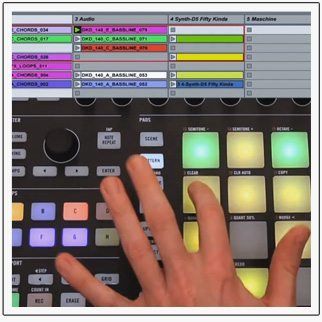
Ableton Push Dj Template
Push is the music making instrument that perfectly integrates with Ableton Live. Make a song from scratch with hands on control of melody, beats and structure.
In this new tutorial series focused on building a DJ template, Dubspot’s Rory PQ shares his insight about digital DJing with Ableton Live and takes us through the steps to build a customized DJ Template. Included is a FREE Ableton Live DJ Template download. Learn more about o ur DJ/Producer Ableton Program and is a powerful tool for producers but it also excels as the ultimate digital DJ platform. Live’s innovative approach to live performance allows you to create and customize DJ templates that suit your needs. It opens up possibilities and gives you the tools to expand your creativity and evolve as a DJ.
Blurring the line between production and performance, Live’s unique interface and features make it possible to transform the stage into a performance studio. Edit macros in word 2013. This tutorial will be the first in aeries on building a custom DJ template in Ableton Live. We will explore some of the advantages of digital DJing using Ableton Live and create a basic DJ template.
The template included in this tutorial will be the foundation for creating additional custom effects in a series of other DJ template building tutorials. Before we get the wheels spinning, you’re welcome to follow along by downloading the FREE Ableton Live DJ Template below. Includes guide for mapping each control. What is Digital DJing? Digital DJing is a more modern approach to performing using computer-based DJ software driven by various MIDI controllers and analog devices. This style of DJing allows for highly customized setups that are intuitive and streamlined. It essentially eliminates the time spent Beatmatching for more creative possibilities.
Digital DJing has evolved rapidly over the years and Live has become one of the leading weapons of choice for many forward-thinking artists looking to take advantage of its non-linear approach to live performance. Visit to see more of Dubspot’s DJ Kiva ‘Guided Dub’ Performance w/ Ableton Live + Akai APC4. Advantages of Performing with Ableton Live Ableton Live’s capabilities and versatility allow artists to create personalized DJ setups tailored to meet individual artistic needs. Below are just a few of the many advantages of using Live as a powerful performance tool. • Trigger an unlimited number of songs and samples • Mix songs seamlessly in sync without manual Beatmatching • The tempo can be changed without affecting a songs pitch • Capable of creating remixes and mashups on-the-fly • Ability to create complex effects configurations • Real-time manipulation of audio and MIDI • Unlimited flexibility and customizability • Capable of using third-party plugins • Unlimited amount of virtual decks • Integration abilities with other DJ software platforms • Portability Building a DJ Template Lets start this party by switching over to Live’s Session View. Session View was designed for live performance and is ideal for creating a DJ setup for many reasons. Mainly, because its easy to visually navigate and simultaneously launch various clips and scenes, create virtual decks and signal routings, stay organized, and have the option to use Live’s built-in cross fader.

In addition, most if not all MIDI controllers that are compatible with Live are designed to control and navigate Lives Session View. Template Overview The DJ Template includes the following: • Two virtual decks labeled Left Deck and Right Deck • One track for additional samples • Custom four band DJ EQ racks for each deck • Lowpass and Highpass filter racks for each deck • Gain and Mute controls for each deck • Custom Short Verb Delay racks for each deck on Return tracks • Expansion Macros for additional effects we will create in other tutorials Creating Virtual Decks To keep things simple at first we will only create two virtual decks to emulate the left and right turntables of a traditional DJ setup. However, I do encourage experimenting with this template and creating as many decks as you like. Although we will be performing on two decks, we will create four Audio tracks.
Two Audio tracks will emulate our virtual decks and contain all the clips used in the DJ set. The other two Audio tracks will be used for routing the signal to all the audio effects, including ‘Dummy Clip’ effects that we will create in the next tutorial of the series. The audio signal will be routed from the Left and Right Decks to the Left and Right Out tracks. This setup allows the original signal to keep playing without any playback interruptions when effects are triggered. It also allows the signal to pass through in parallel unaffected for stability and better performance. Step One Creating Virtual Decks • Create four Audio tracks in Session View • Label the first track Left Deck • Label the second track Left Out • Label the third track Right Out • Label the fourth track Right Deck • Optional – Create an empty Audio track to separate the left and right tracks Step Two Routing the Signal Expand Live’s In/Out Section and set the following routing destinations for each track. • Left Deck – Select Left Out from the Audio To chooser • Left Out – Select the Monitor ‘In’ button • Right Deck – Select Right Out from the Audio To chooser • Right Out – Select the Monitor ‘In’ button Creating Audio Effects Now that we have virtual decks to playback our club bangers, its time to set up some basic controls commonly found on most DJ mixers.